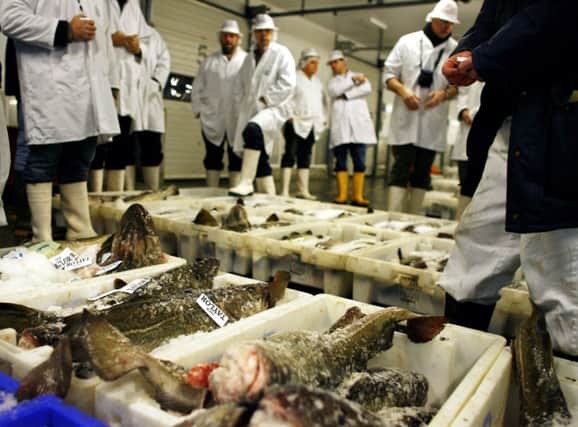Lift ban on discards for the good of all concerned


There must come a time when the law of unintended consequences prevails over bureaucratic intransigence.
At some point, our own politicians and even European Union officials will be forced to concede that they got it wrong, and that what sounded like a great idea was not supposed to punish the very people they said they wanted to help.
Advertisement
Hide AdAdvertisement
Hide AdSo it is with the ban on discarding fish at sea, or at least the version of it that MEPs voted through last year.
Nobody wants discards, least of all fishermen, who find nothing amusing about throwing perfectly marketable produce back over the side. That’s why the Scottish fishing industry has spent so much time, effort and money on substantially reducing discards over the past 20 years or more.
Unfortunately, there’s nothing like a complex issue to bring out the worst in politicians everywhere. Instead of asking “What causes discards?”, green activists and MEPs said “Let’s ban them”, neatly mistaking the symptoms for the disease. It’s like a hospital banning high temperatures or internal bleeding, removing them at the stroke of an administrator’s pen and pretending that nobody is ill any more.
If only it were that simple! The fact is that the discard ban has not made everything all right. Because nobody thought to talk to people who actually catch fish – and who depend the most acutely on healthy fish stocks – the legislation now making its painful way towards implementation is horribly flawed.
By failing to consider the causes of discards, and notably a management regime completely out of sync with a complex and dynamic ecosystem, the new rules are potentially unworkable.
So imagine this. A community such as the Shetland Isles, highly dependent on fishing, as it has been for over 4,000 years, is now threatened with economic and social ruin. Not because we’ve run out of fish; quite the opposite, in fact. The waters around Shetland are among the most productive in Europe, and our stocks are as diverse as you could hope to find in any commercial fishery.
Nor can the blame be put on globalisation, or the relocation of operations by multinational corporations. Virtually all our vessels are owned by local skippers and crews, right from single-handed inshore creel boats to 60 metre-plus pelagic trawlers. If you want to know what a successful, community-based industry looks like, come to Shetland.
No, the threat is entirely political, buried in dry text that apparently matters more than families and their businesses. Given the number of times we have been told by officials that the law, sadly, is the law, meaning we just have to lump it, you could be forgiven for confusing the new rules on discards with the Ten Commandments.
Advertisement
Hide AdAdvertisement
Hide AdThat just won’t wash. Presumably, the legislation that bans discards wasn’t intended to undermine the vitality of the Shetland community, or punish fishermen right across the UK who operate responsibly and in an entirely sustainable manner.
What is wrong about looking at it again? To err is human; to refuse to admit it is plain daft.
Although it warned that the new rules on discards could be unworkable, the Scottish fishing industry has been working flat out on the practicalities of implementing them for the past year or more. It is now saying that, yes, the rules really are unworkable – and anyone who can demonstrate otherwise is more than welcome to do so. You cannot imagine how relieved we would all be.
It will certainly take courage to admit that the legislation on discards, handed down from Brussels and threatening exemplary fishing communities, should be given a proper examination and, if needs be, extensively revised.
It will also take humility to admit that people living off the sea for generations might know a little more than a landlocked MEP, or even a celebrity chef.
There is still time. The legislation is a well-intentioned bid to deal with a complex problem, but if it doesn’t work there’s no virtue in sticking with it.
Like the rest of the Scottish fishing industry, the Shetland fleet is more than willing to contribute to solutions that work. This will mean starting with the underlying causes, not an obsession with symptoms.
As we have amply proved with gear trials, real-time closures and data collection, we are keen to make real progress on a better management system – including discards.
Advertisement
Hide AdAdvertisement
Hide AdNot for the benefit of the media, or because the green lobby likes it, but because the future of our community depends on the sea and making the best of its resources.
• Simon Collins is executive officer of Shetland Fishermen’s Association
SEE ALSO